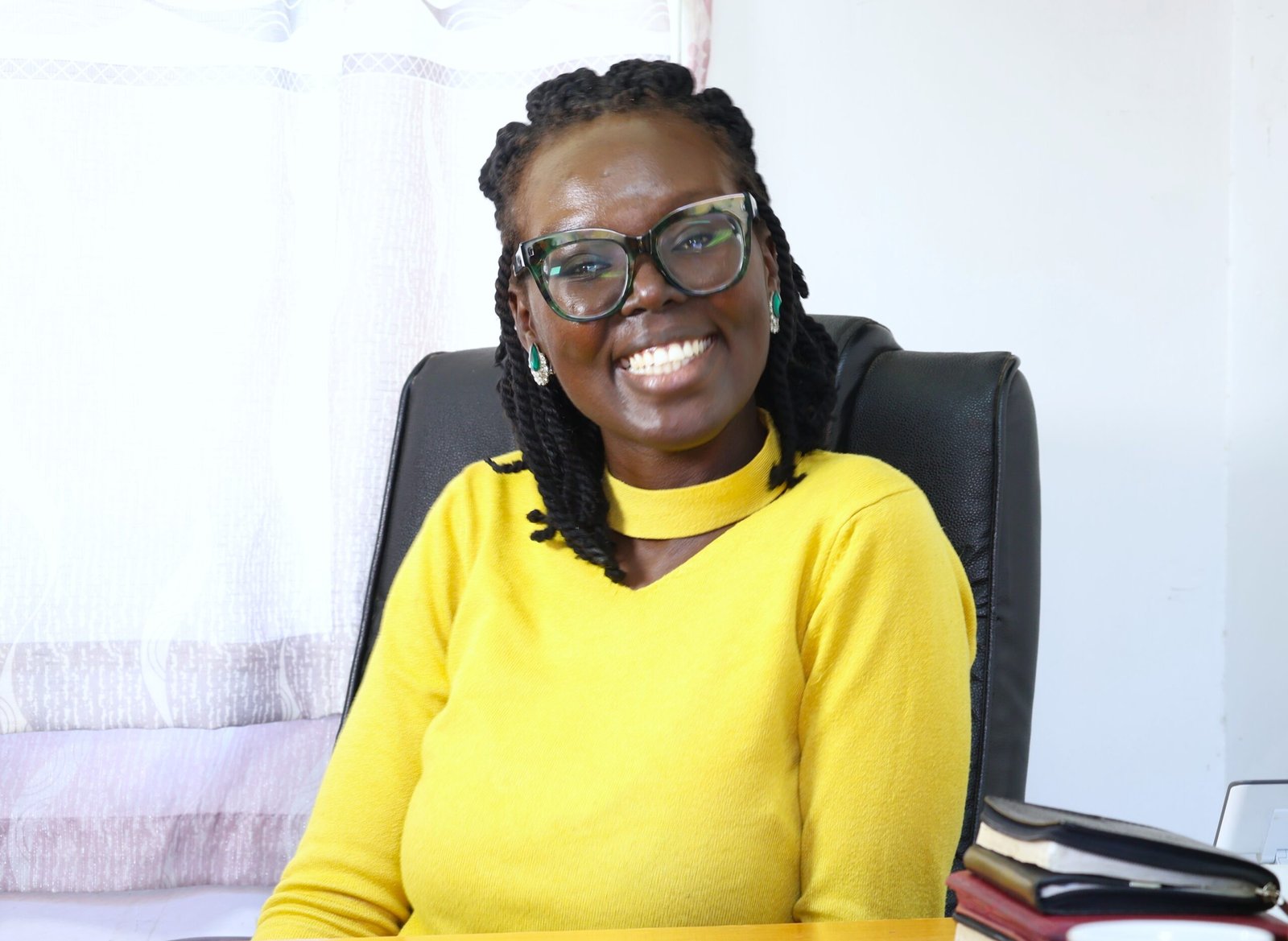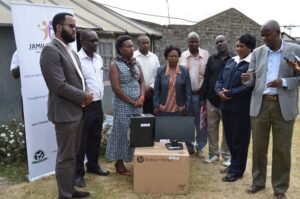Police officers play a critical role in safeguarding communities, often working long hours under intense pressure and in high-risk environments. This demanding nature of their work takes a toll on their mental health, yet conversations around psychological well-being within the Kenyan National Police Service (NPS) remain limited.
In Nakuru County, MIDRIFT has made efforts to change this narrative, leading from the forefront to bridge the gap between mental health wellness in the police service. In partnership with the NPS, MIDRIFT sought to create safe spaces for officers to openly discuss mental health, reduce stigma, and strengthen awareness through sensitization forums and workshops. These engagements not only encouraged officers to seek help but also fostered peer support and improved relationships between the police and the communities they serve.
We spoke with Sheila Momute, a counseling psychologist with the NPS, who shared insights into the mental health challenges facing officers, the progress made through awareness forums, and the importance of collaboration in building a healthier police service: (Q- question, A- answer)

National Police Service Psychologist, Rift Valley Region, Ms. Sheila Momute
Q: Thank you so much for taking the time to meet with us. Could you please introduce yourself and tell us a bit about what you do?
A: My name is Sheila Momute. I am a counseling psychologist by profession, currently serving as a counselor for the National Police Service (NPS) in Nakuru County, and by extension, the Rift Valley region. I handle the mental health concerns of police officers. Given the demanding nature of their work—long hours, high stress, and exposure to difficult situations—officers often experience a range of mental health challenges, which I address on a day-to-day basis.
Q: What is your scope of work?
A: I am in charge of handling all mental health cases affecting police officers and their immediate family members within Nakuru County. These range from depression, anxiety, post-traumatic stress disorder, and substance use disorders, to financial stress and other psychosocial challenges.
Q: What is the current level of mental health awareness among police officers? Can officers in need of your services come to you directly?
A: At present, the level of awareness among the officers is moderate. Since assuming office, we have conducted a number of sensitization sessions, and more officers are now seeking mental health services. Some approach me directly, as my office is open to all ranks, while others are referred by senior officers. We strongly encourage officers at all levels to willingly seek help whenever they need it.
Q: What engagement strategy are you using with officers seeking help? How many times can one access your services in a given period of time? Do they have to come to your office, or can you also visit them at their stations?
A: While we encourage officers to come to the office, we also conduct outreaches by visiting the police stations, providing counseling, sensitization, and awareness sessions to officers at their work stations. Apart from that and given the vastness of the region, we have also embraced tele-counseling, allowing officers to call in and receive support over the phone if they cannot come in person.
Q: If you’re able to share, what are some of the common mental health challenges that police officers deal with?
A: The most common challenges we address include substance use disorders, depression linked to the stressful nature of the work police officers do, and post-traumatic stress disorders arising from exposure to traumatic incidents such as rescues or violent encounters – there are a lot of traumas that are related to their job. These are the main cases we handle regularly.
Q: You have been engaging with MIDRIFT HURINET in various forums aimed at strengthening mental health awareness among police officers. Following these forums, have you noted any changes among the police officers on matters of mental health awareness and wellness?
A: MIDRIFT has been very instrumental in supporting the NPS. It is through this support from MIDRIFT that we have been able to organize and execute sensitization workshops with our officers, creating awareness among more officers than we would have earlier. As a result, we have received more referrals and noticed significant positive change.
So far, we have seen a noticeable shift in mindset—officers are more willing to seek services, refer their colleagues, and proactively manage their mental health. There is a clear difference in how police officers handle clients at the station, manage their mental health, and identify colleagues who are undergoing mental health issues; some even refer their colleagues to me, which is a great improvement.
Compared to before MIDRIFT’s involvement, the number of officers seeking services has grown, and overall well-being has improved. From identifying the signs of mental health issues to seeking help willingly and referring others for these services, the officers are at a better level of awareness. The stigma surrounding seeking help has decreased, and peer referrals have increased, creating a desirable ripple effect in terms of officers coming forward to seek services.
Q: Are there some gaps within the NPS that could be addressed to strengthen mental health awareness and services?
A: The main gap is the limited number of psychologists, counselors, and chaplains. A few professionals are expected to cover a vast region, leaving many cases unaddressed. This has caused some cases to go unaddressed. While the NPS is working towards onboarding more psychosocial support providers, we need to work towards training more police officers who can offer some level of support and help for other officers within the police stations. These officers can provide first-level support, identify urgent cases early, and refer them to professionals for intervention.
Q: How important is it to continue engaging the officers on matters of mental health? What areas can we collaboratively address in the future?
A: A mentally healthy officer is more productive and provides better services to civilians. Apart from the workshops, which have brought about significant change among the police officers, engagement is still very critical in the following areas;
Capacity building of police officers and training them as peer counselors and mentors to support their colleagues. Peer-to-peer counseling will help identify colleagues in need of support, provide timely assistance, and empower officers to look out for one another.
Another area of collaboration is engaging families through forums such as family days. This creates awareness of the challenges police officers face, how these affect their mental health, and how families can play a supportive role in preventing issues from escalating.
MIDRIFT and the NPS can also strengthen collaboration by holding regular sensitization and awareness forums targeting more officers—including senior ranks—and expanding beyond Nakuru County. The positive changes already seen among engaged officers highlight the need to widen the scope, make the sessions continuous, and equip officers with skills in self-awareness and mental health management.
Q: As we reach the end of this interview, what are your final remarks?
A: I call upon all police officers to prioritize their mental health and well-being. Seeking help is not a weakness—it is a sign of strength and self-awareness. When officers are mentally healthy, they are more productive, make better decisions, and build stronger relationships with the communities they serve.
At the same time, I encourage continuous collaboration between the National Police Service, organizations such as MIDRIFT, and other stakeholders. By working together, we can expand awareness, build the capacity of peer counselors within stations, and involve families in supporting officers. Mental health is a collective responsibility, and through sustained partnerships and open conversations, we can create a supportive environment where no officer feels alone in their struggles.
– – –
MIDRIFT extends its sincere gratitude to the National Police Service, through the Rift Valley Regional Office, for their support in facilitating this interview. All police officers in Nakuru and the surrounding areas in need of mental health support are encouraged to reach out to the psychologist through the NPSC toll-free line: 0800 721 070.



